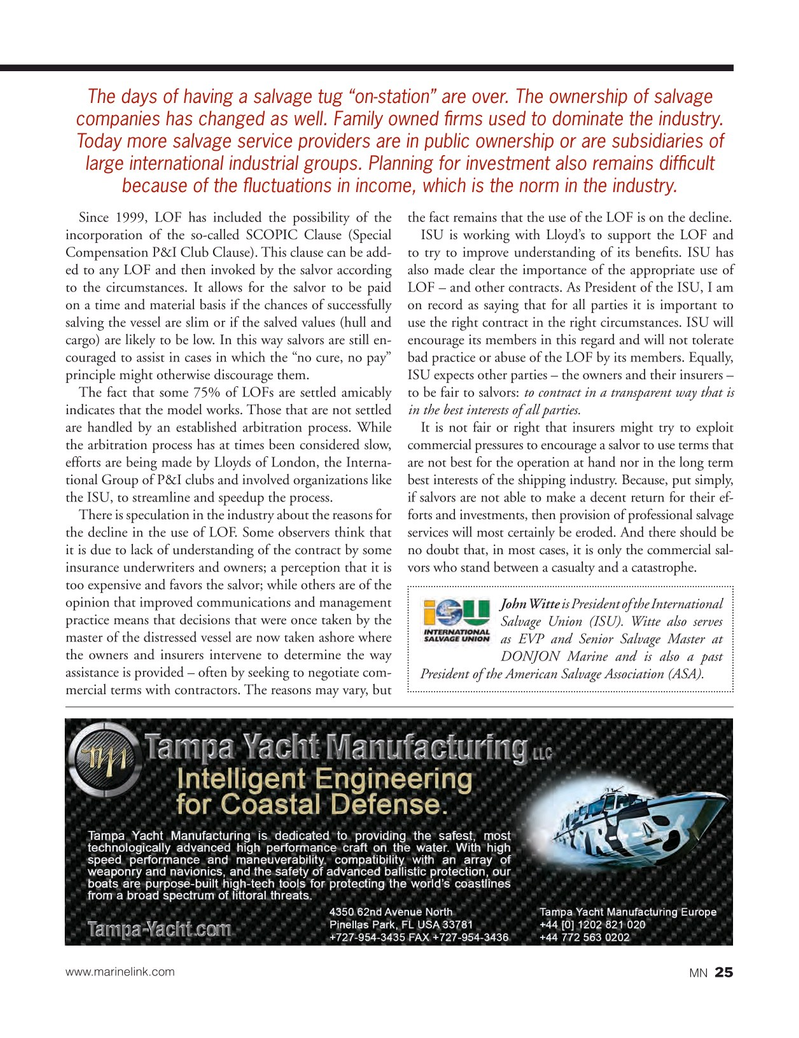
Page 25: of Marine News Magazine (October 2016)
Salvage & Spill Response
Read this page in Pdf, Flash or Html5 edition of October 2016 Marine News Magazine
The days of having a salvage tug “on-station” are over. The ownership of salvage companies has changed as well. Family owned ? rms used to dominate the industry.
Today more salvage service providers are in public ownership or are subsidiaries of large international industrial groups. Planning for investment also remains dif? cult because of the ? uctuations in income, which is the norm in the industry.
Since 1999, LOF has included the possibility of the the fact remains that the use of the LOF is on the decline.
incorporation of the so-called SCOPIC Clause (Special ISU is working with Lloyd’s to support the LOF and
Compensation P&I Club Clause). This clause can be add- to try to improve understanding of its bene? ts. ISU has ed to any LOF and then invoked by the salvor according also made clear the importance of the appropriate use of to the circumstances. It allows for the salvor to be paid LOF – and other contracts. As President of the ISU, I am on a time and material basis if the chances of successfully on record as saying that for all parties it is important to salving the vessel are slim or if the salved values (hull and use the right contract in the right circumstances. ISU will cargo) are likely to be low. In this way salvors are still en- encourage its members in this regard and will not tolerate couraged to assist in cases in which the “no cure, no pay” bad practice or abuse of the LOF by its members. Equally, principle might otherwise discourage them. ISU expects other parties – the owners and their insurers –
The fact that some 75% of LOFs are settled amicably to be fair to salvors: to contract in a transparent way that is indicates that the model works. Those that are not settled in the best interests of all parties.
are handled by an established arbitration process. While It is not fair or right that insurers might try to exploit the arbitration process has at times been considered slow, commercial pressures to encourage a salvor to use terms that efforts are being made by Lloyds of London, the Interna- are not best for the operation at hand nor in the long term tional Group of P&I clubs and involved organizations like best interests of the shipping industry. Because, put simply, the ISU, to streamline and speedup the process. if salvors are not able to make a decent return for their ef-
There is speculation in the industry about the reasons for forts and investments, then provision of professional salvage the decline in the use of LOF. Some observers think that services will most certainly be eroded. And there should be it is due to lack of understanding of the contract by some no doubt that, in most cases, it is only the commercial sal- insurance underwriters and owners; a perception that it is vors who stand between a casualty and a catastrophe. too expensive and favors the salvor; while others are of the opinion that improved communications and management
John Witte is President of the International practice means that decisions that were once taken by the
Salvage Union (ISU). Witte also serves master of the distressed vessel are now taken ashore where as EVP and Senior Salvage Master at the owners and insurers intervene to determine the way
DONJON Marine and is also a past assistance is provided – often by seeking to negotiate com-
President of the American Salvage Association (ASA).
mercial terms with contractors. The reasons may vary, but www.marinelink.com
MN 25
MN Oct16 Layout 18-31.indd 25 9/21/2016 3:18:28 PM

 24
24

 26
26
